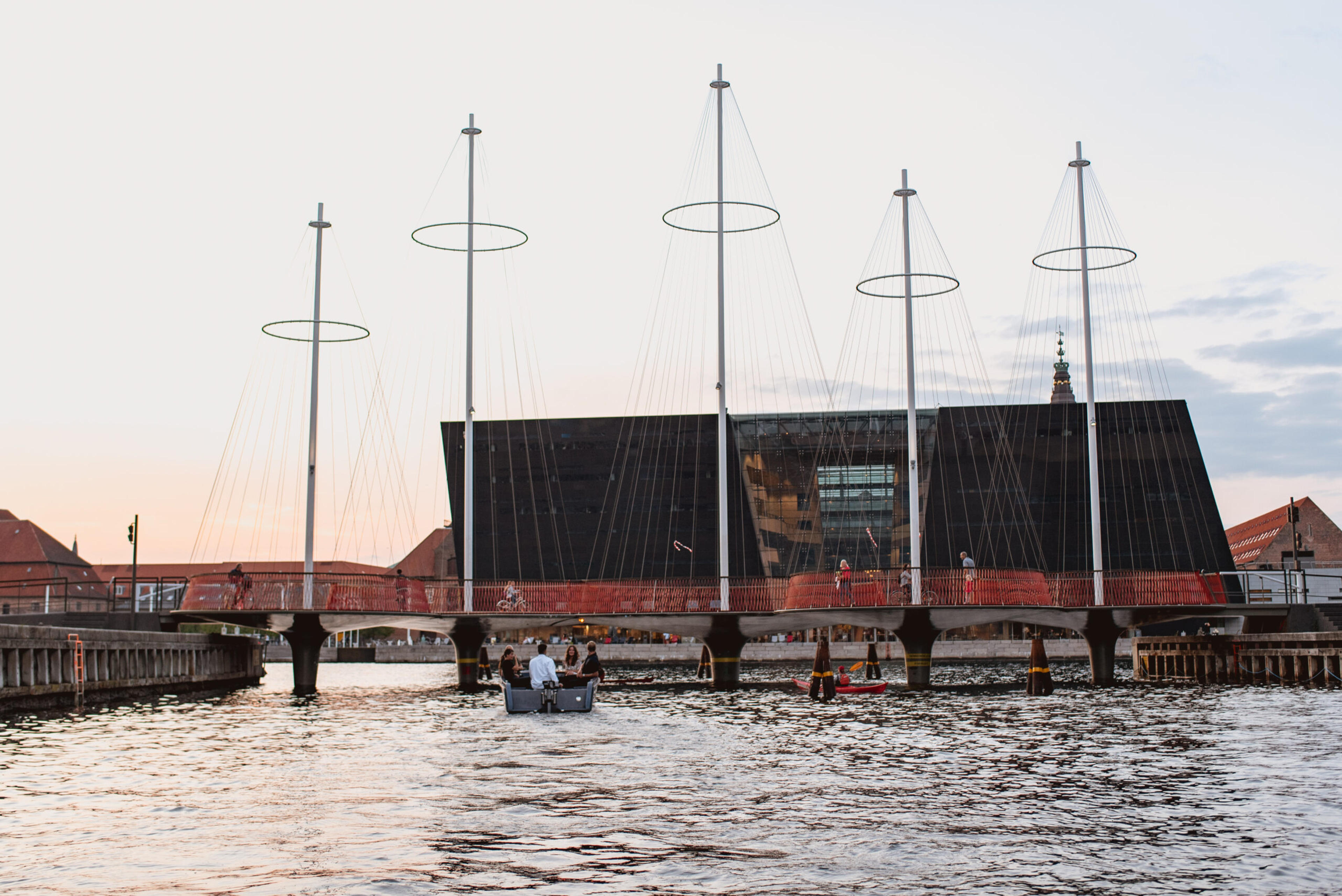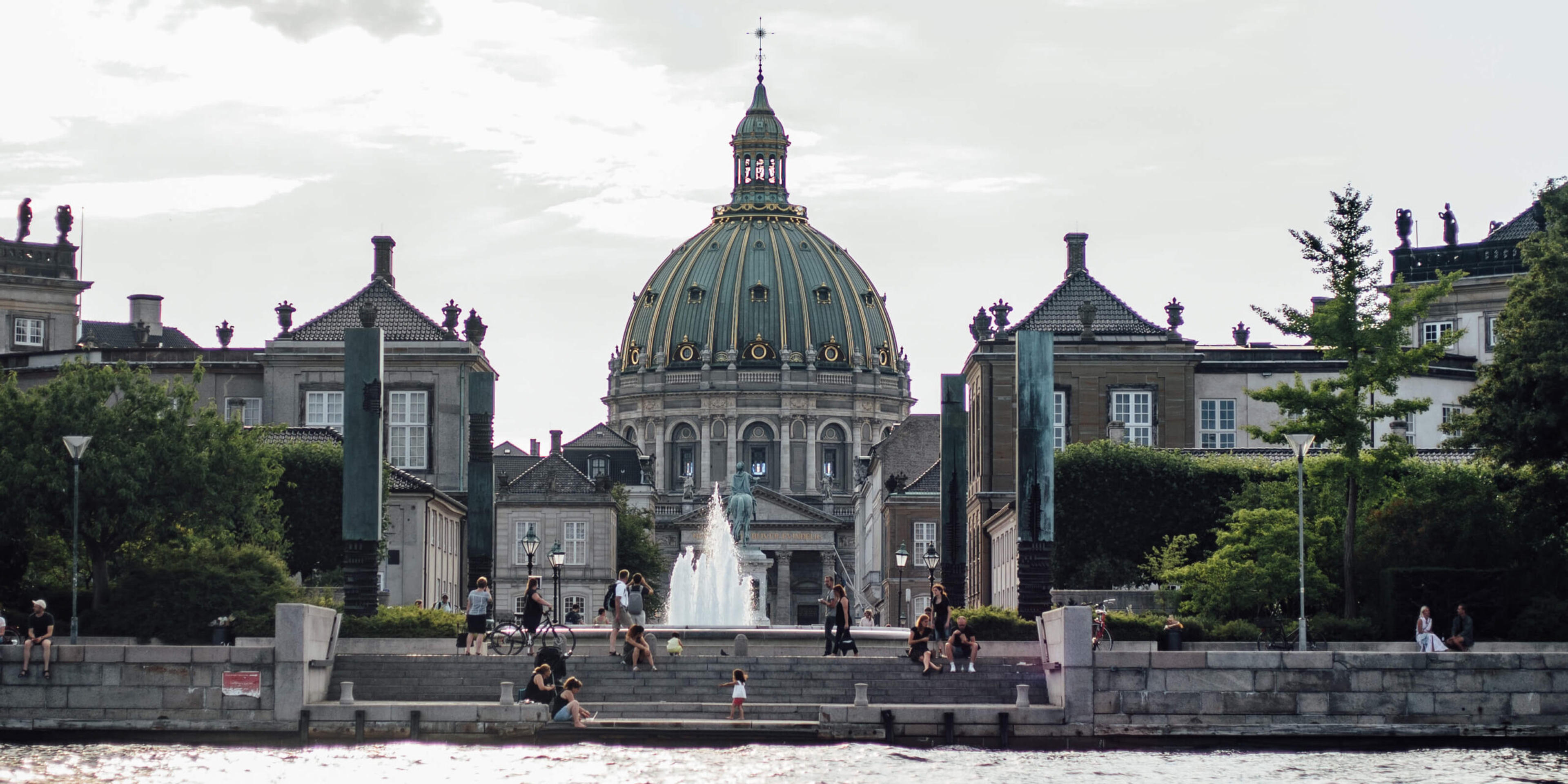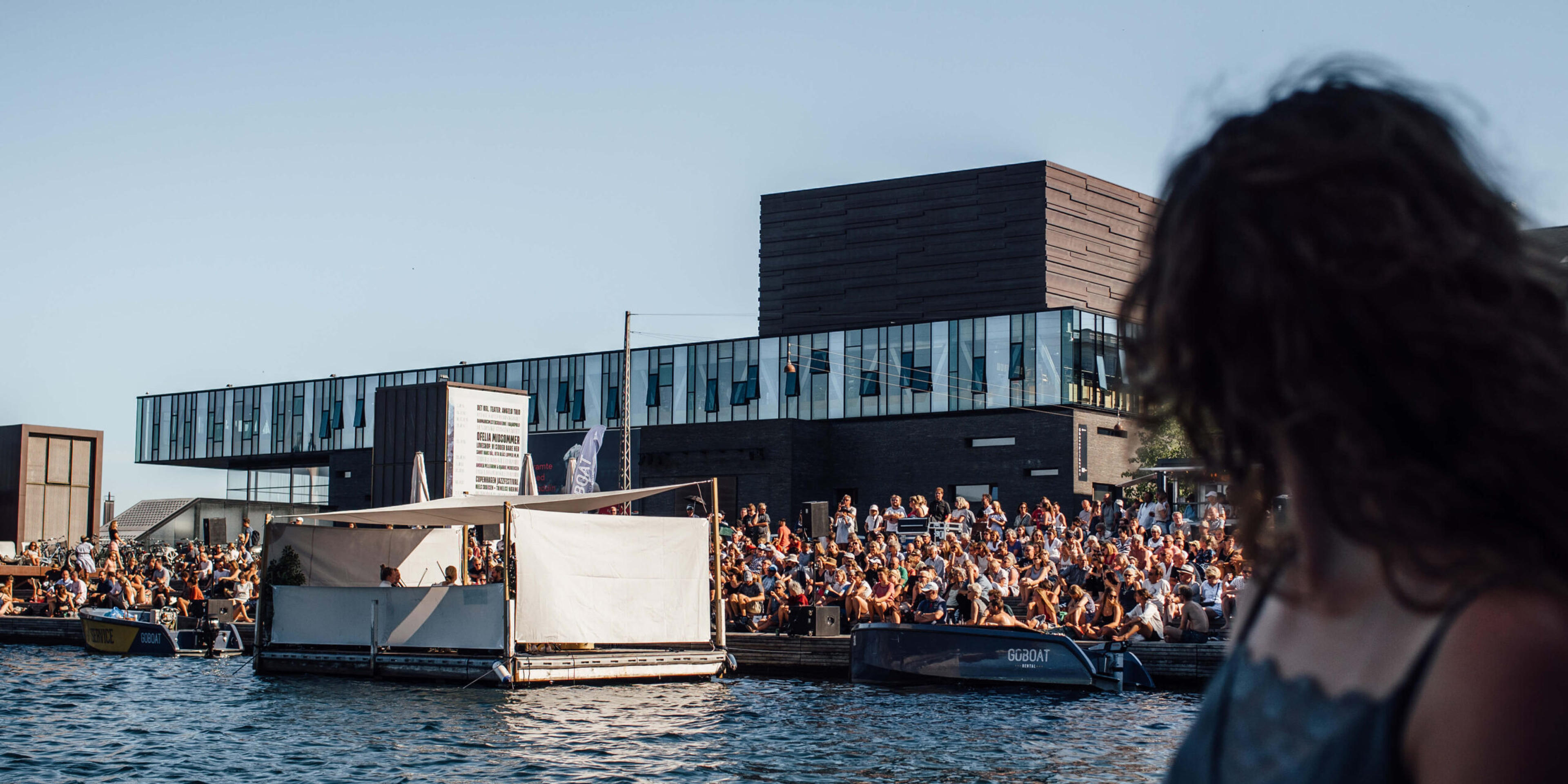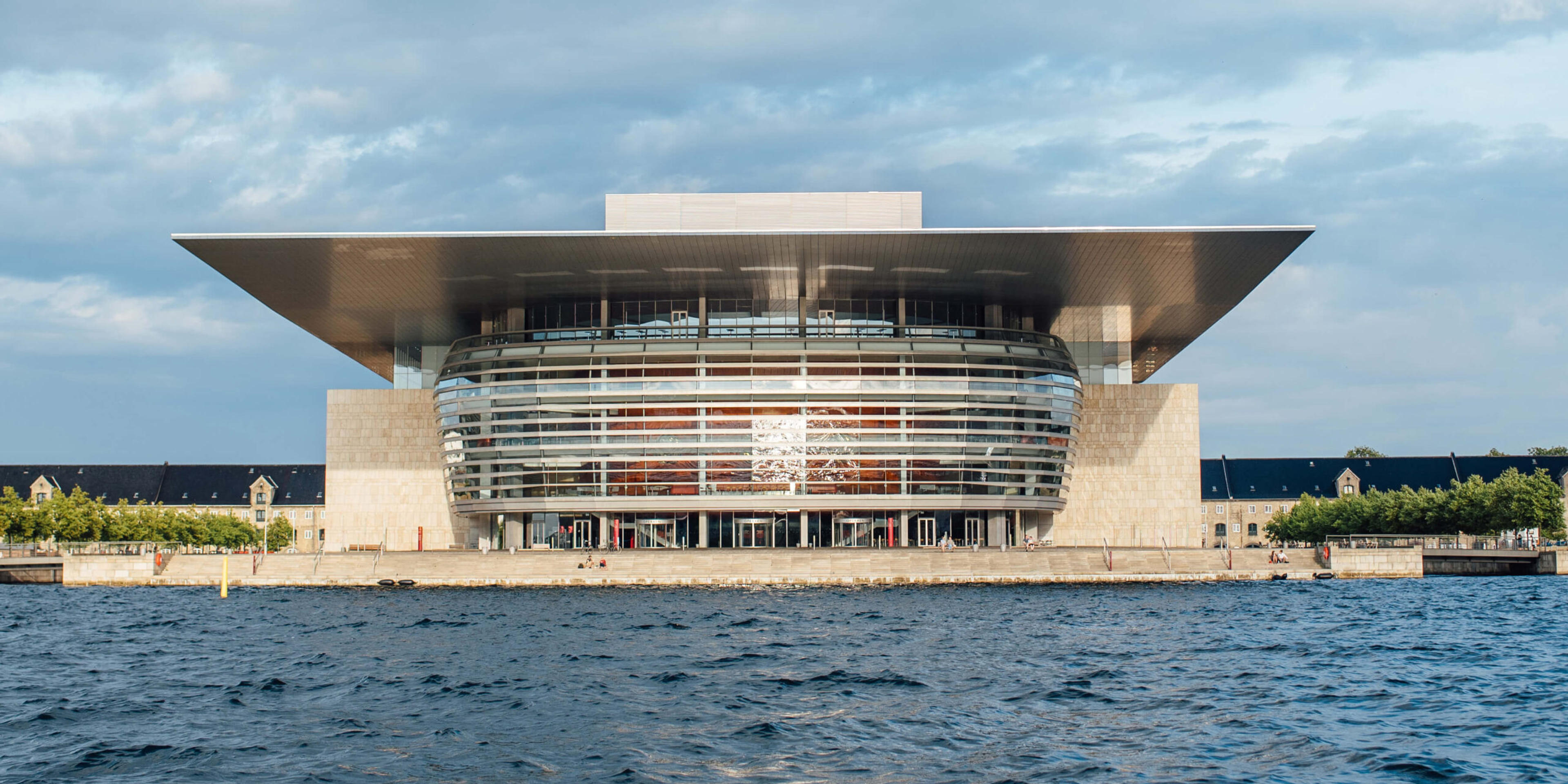


Marble Bridge: Of the four bridges spanning Frederiksholms Kanal, the most notable is Marble Bridge which provides access to Christiansborg's riding grounds. The old main entrance and one of few surviving features of the first Christiansborg Palace which burned in 1794, this rococo-style bridge was paved with Norwegian marble, hence the name.
Foto: Lærke Andersson
Photo: Lærke Andersson
Marble Bridge: Of the four bridges spanning Frederiksholms Kanal, the most notable is Marble Bridge which provides access to Christiansborg's riding grounds. The old main entrance and one of few surviving features of the first Christiansborg Palace which burned in 1794, this rococo-style bridge was paved with Norwegian marble, hence the name.
1/8

Christianshavns Canal: The Christianshavn quarters and neighborhood is an architectural gem for tourist and visitors that can experience houses and building with a rich historic heritage from the time of the establishment of Christianshavn - like the preserved Artillery Barracks from 1664 - called “Irgens Gård” at Strandgade 44.
Foto: Abdellah Ihadian
Photo: Abdellah Ihadian
Christianshavns Canal: The Christianshavn quarters and neighborhood is an architectural gem for tourist and visitors that can experience houses and building with a rich historic heritage from the time of the establishment of Christianshavn - like the preserved Artillery Barracks from 1664 - called “Irgens Gård” at Strandgade 44.
2/8

The Circle Bridge: Probably the most beautiful bridge in Copenhagen, The Circle Bridge is on the harbor in Christianshavn. Designed by Danish-Icelandic artist Olafur Eliasson, it recalls the shape of ships from years gone by. The design uses five masts and resembles a ship by the quay as a reference to Copenhagen’s shipping history. It also has of five differently sized circular platforms, for which the bridge is named.
Foto: Abdellah Ihadian
Photo: Abdellah Ihadian
The Circle Bridge: Probably the most beautiful bridge in Copenhagen, The Circle Bridge is on the harbor in Christianshavn. Designed by Danish-Icelandic artist Olafur Eliasson, it recalls the shape of ships from years gone by. The design uses five masts and resembles a ship by the quay as a reference to Copenhagen’s shipping history. It also has of five differently sized circular platforms, for which the bridge is named.
3/8

Christiansborg Palace: A grand and historic landmark in the heart of Copenhagen, Christiansborg serves as the center of Denmark's political power, housing the Danish Parliament, the Supreme Court, and the Prime Minister's Office. The palace also features royal reception rooms used for official events and state functions, reflecting centuries of Danish history and architectural grandeur.
Foto: Abdellah Ihadian
Photo: Abdellah Ihadian
Christiansborg Palace: A grand and historic landmark in the heart of Copenhagen, Christiansborg serves as the center of Denmark's political power, housing the Danish Parliament, the Supreme Court, and the Prime Minister's Office. The palace also features royal reception rooms used for official events and state functions, reflecting centuries of Danish history and architectural grandeur.
4/8

The Inner Harbor Bridge (Kissing Bridge): A modern pedestrian and cyclist bridge connecting the neighborhoods of Nyhavn and Christianshavn. Opened in 2016. Often referred to as the "Kissing Bridge" due to its unique mechanism that separates in the middle to allow boats to pass, it has become a popular spot for both locals and tourists.
Foto: Abdellah Ihadian
Photo: Abdellah Ihadian
The Inner Harbor Bridge (Kissing Bridge): A modern pedestrian and cyclist bridge connecting the neighborhoods of Nyhavn and Christianshavn. Opened in 2016. Often referred to as the "Kissing Bridge" due to its unique mechanism that separates in the middle to allow boats to pass, it has become a popular spot for both locals and tourists.
5/8

The Royal Danish Playhouse: The home of the Royal Danish Theatre’s drama productions. Opened in 2008, the building features a stunning design with expansive glass facades, a copper-clad roof, and a wooden promenade that extends over the water, inviting visitors to enjoy the view. The playhouse combines cutting-edge architecture with cultural excellence, hosting a wide range of performances in its state-of-the-art theaters.
Foto: Erling Brodersen
Photo: Erling Brodersen
The Royal Danish Playhouse: The home of the Royal Danish Theatre’s drama productions. Opened in 2008, the building features a stunning design with expansive glass facades, a copper-clad roof, and a wooden promenade that extends over the water, inviting visitors to enjoy the view. The playhouse combines cutting-edge architecture with cultural excellence, hosting a wide range of performances in its state-of-the-art theaters.
6/8

Our Savior Church: A historic baroque church in Copenhagen, renowned for its striking spiral tower with an external staircase that offers breathtaking views of the city. Completed in 1752, the church features a richly decorated interior, including an impressive organ and intricate wood carvings. Its iconic spire, winding upwards with 400 steps, has made it one of the city’s most recognizable landmarks.
Foto: Abdellah Ihadian
Photo: Abdellah Ihadian
Our Savior Church: A historic baroque church in Copenhagen, renowned for its striking spiral tower with an external staircase that offers breathtaking views of the city. Completed in 1752, the church features a richly decorated interior, including an impressive organ and intricate wood carvings. Its iconic spire, winding upwards with 400 steps, has made it one of the city’s most recognizable landmarks.
7/8

Holmens Bridge: Connecting the areas around Slotsholmen and Gammel Strand. Originally built in the 17th century and reconstructed several times, it serves as a vital link in the city’s infrastructure. Known for its elegant design and proximity to landmarks like Christiansborg Palace and the National Bank,
Foto: Lærke Andersson
Photo: Lærke Andersson
Holmens Bridge: Connecting the areas around Slotsholmen and Gammel Strand. Originally built in the 17th century and reconstructed several times, it serves as a vital link in the city’s infrastructure. Known for its elegant design and proximity to landmarks like Christiansborg Palace and the National Bank,
8/8



Marble Bridge: Of the four bridges spanning Frederiksholms Kanal, the most notable is Marble Bridge which provides access to Christiansborg's riding grounds. The old main entrance and one of few surviving features of the first Christiansborg Palace which burned in 1794, this rococo-style bridge was paved with Norwegian marble, hence the name.
Foto: Lærke Andersson
Photo: Lærke Andersson
Marble Bridge: Of the four bridges spanning Frederiksholms Kanal, the most notable is Marble Bridge which provides access to Christiansborg's riding grounds. The old main entrance and one of few surviving features of the first Christiansborg Palace which burned in 1794, this rococo-style bridge was paved with Norwegian marble, hence the name.
1/10

Christianshavns Canal: The Christianshavn quarters and neighborhood is an architectural gem for tourist and visitors that can experience houses and building with a rich historic heritage from the time of the establishment of Christianshavn - like the preserved Artillery Barracks from 1664 - called “Irgens Gård” at Strandgade 44.
Foto: Abdellah Ihadian
Photo: Abdellah Ihadian
Christianshavns Canal: The Christianshavn quarters and neighborhood is an architectural gem for tourist and visitors that can experience houses and building with a rich historic heritage from the time of the establishment of Christianshavn - like the preserved Artillery Barracks from 1664 - called “Irgens Gård” at Strandgade 44.
2/10

The Circle Bridge: Probably the most beautiful bridge in Copenhagen, The Circle Bridge is on the harbor in Christianshavn. Designed by Danish-Icelandic artist Olafur Eliasson, it recalls the shape of ships from years gone by. The design uses five masts and resembles a ship by the quay as a reference to Copenhagen’s shipping history. It also has of five differently sized circular platforms, for which the bridge is named.
Foto: Abdellah Ihadian
Photo: Abdellah Ihadian
The Circle Bridge: Probably the most beautiful bridge in Copenhagen, The Circle Bridge is on the harbor in Christianshavn. Designed by Danish-Icelandic artist Olafur Eliasson, it recalls the shape of ships from years gone by. The design uses five masts and resembles a ship by the quay as a reference to Copenhagen’s shipping history. It also has of five differently sized circular platforms, for which the bridge is named.
3/10

Christiansborg Palace: A grand and historic landmark in the heart of Copenhagen, Christiansborg serves as the center of Denmark's political power, housing the Danish Parliament, the Supreme Court, and the Prime Minister's Office. The palace also features royal reception rooms used for official events and state functions, reflecting centuries of Danish history and architectural grandeur.
Foto: Abdellah Ihadian
Photo: Abdellah Ihadian
Christiansborg Palace: A grand and historic landmark in the heart of Copenhagen, Christiansborg serves as the center of Denmark's political power, housing the Danish Parliament, the Supreme Court, and the Prime Minister's Office. The palace also features royal reception rooms used for official events and state functions, reflecting centuries of Danish history and architectural grandeur.
4/10

The Inner Harbor Bridge (Kissing Bridge): A modern pedestrian and cyclist bridge connecting the neighborhoods of Nyhavn and Christianshavn. Opened in 2016. Often referred to as the "Kissing Bridge" due to its unique mechanism that separates in the middle to allow boats to pass, it has become a popular spot for both locals and tourists.
Foto: Abdellah Ihadian
Photo: Abdellah Ihadian
The Inner Harbor Bridge (Kissing Bridge): A modern pedestrian and cyclist bridge connecting the neighborhoods of Nyhavn and Christianshavn. Opened in 2016. Often referred to as the "Kissing Bridge" due to its unique mechanism that separates in the middle to allow boats to pass, it has become a popular spot for both locals and tourists.
5/10

The Royal Danish Playhouse: The home of the Royal Danish Theatre’s drama productions. Opened in 2008, the building features a stunning design with expansive glass facades, a copper-clad roof, and a wooden promenade that extends over the water, inviting visitors to enjoy the view. The playhouse combines cutting-edge architecture with cultural excellence, hosting a wide range of performances in its state-of-the-art theaters.
Foto: Erling Brodersen
Photo: Erling Brodersen
The Royal Danish Playhouse: The home of the Royal Danish Theatre’s drama productions. Opened in 2008, the building features a stunning design with expansive glass facades, a copper-clad roof, and a wooden promenade that extends over the water, inviting visitors to enjoy the view. The playhouse combines cutting-edge architecture with cultural excellence, hosting a wide range of performances in its state-of-the-art theaters.
6/10

Our Savior Church: A historic baroque church in Copenhagen, renowned for its striking spiral tower with an external staircase that offers breathtaking views of the city. Completed in 1752, the church features a richly decorated interior, including an impressive organ and intricate wood carvings. Its iconic spire, winding upwards with 400 steps, has made it one of the city’s most recognizable landmarks.
Foto: Abdellah Ihadian
Photo: Abdellah Ihadian
Our Savior Church: A historic baroque church in Copenhagen, renowned for its striking spiral tower with an external staircase that offers breathtaking views of the city. Completed in 1752, the church features a richly decorated interior, including an impressive organ and intricate wood carvings. Its iconic spire, winding upwards with 400 steps, has made it one of the city’s most recognizable landmarks.
7/10

Holmens Bridge: Connecting the areas around Slotsholmen and Gammel Strand. Originally built in the 17th century and reconstructed several times, it serves as a vital link in the city’s infrastructure. Known for its elegant design and proximity to landmarks like Christiansborg Palace and the National Bank,
Foto: Lærke Andersson
Photo: Lærke Andersson
Holmens Bridge: Connecting the areas around Slotsholmen and Gammel Strand. Originally built in the 17th century and reconstructed several times, it serves as a vital link in the city’s infrastructure. Known for its elegant design and proximity to landmarks like Christiansborg Palace and the National Bank,
8/10

Amalienborg and Marble Church: The official residence of the Danish royal family, is a magnificent rococo palace in the heart of Copenhagen. Its four identical buildings encircle an elegant square, featuring a grand statue of King Frederik V. Behind the palace lies the Marble Church (Frederik's Church), a stunning architectural gem with a towering green dome, inspired by St. Peter’s Basilica in Rome. Built in the 18th century, the church boasts intricate marble details and a serene interior.
Foto: Abdellah Ihadian
Photo: Abdellah Ihadian
Amalienborg and Marble Church: The official residence of the Danish royal family, is a magnificent rococo palace in the heart of Copenhagen. Its four identical buildings encircle an elegant square, featuring a grand statue of King Frederik V. Behind the palace lies the Marble Church (Frederik's Church), a stunning architectural gem with a towering green dome, inspired by St. Peter’s Basilica in Rome. Built in the 18th century, the church boasts intricate marble details and a serene interior.
9/10

Ofelia Plads: A vibrant cultural hub located near the Royal Danish Playhouse and the harbor. Opened in 2016, this open-air venue hosts concerts, performances, and public events, offering a dynamic blend of culture and leisure. With its sleek wooden deck, scenic views of the harbor, and seating areas that invite relaxation, it’s a popular gathering spot for both locals and visitors.
Foto: Abdellah Ihadian
Photo: Abdellah Ihadian
Ofelia Plads: A vibrant cultural hub located near the Royal Danish Playhouse and the harbor. Opened in 2016, this open-air venue hosts concerts, performances, and public events, offering a dynamic blend of culture and leisure. With its sleek wooden deck, scenic views of the harbor, and seating areas that invite relaxation, it’s a popular gathering spot for both locals and visitors.
10/10



Marble Bridge: Of the four bridges spanning Frederiksholms Kanal, the most notable is Marble Bridge which provides access to Christiansborg's riding grounds. The old main entrance and one of few surviving features of the first Christiansborg Palace which burned in 1794, this rococo-style bridge was paved with Norwegian marble, hence the name.
Foto: Lærke Andersson
Photo: Lærke Andersson
Marble Bridge: Of the four bridges spanning Frederiksholms Kanal, the most notable is Marble Bridge which provides access to Christiansborg's riding grounds. The old main entrance and one of few surviving features of the first Christiansborg Palace which burned in 1794, this rococo-style bridge was paved with Norwegian marble, hence the name.
1/13

Christianshavns Canal: The Christianshavn quarters and neighborhood is an architectural gem for tourist and visitors that can experience houses and building with a rich historic heritage from the time of the establishment of Christianshavn - like the preserved Artillery Barracks from 1664 - called “Irgens Gård” at Strandgade 44.
Foto: Abdellah Ihadian
Photo: Abdellah Ihadian
Christianshavns Canal: The Christianshavn quarters and neighborhood is an architectural gem for tourist and visitors that can experience houses and building with a rich historic heritage from the time of the establishment of Christianshavn - like the preserved Artillery Barracks from 1664 - called “Irgens Gård” at Strandgade 44.
2/13

The Circle Bridge: Probably the most beautiful bridge in Copenhagen, The Circle Bridge is on the harbor in Christianshavn. Designed by Danish-Icelandic artist Olafur Eliasson, it recalls the shape of ships from years gone by. The design uses five masts and resembles a ship by the quay as a reference to Copenhagen’s shipping history. It also has of five differently sized circular platforms, for which the bridge is named.
Foto: Abdellah Ihadian
Photo: Abdellah Ihadian
The Circle Bridge: Probably the most beautiful bridge in Copenhagen, The Circle Bridge is on the harbor in Christianshavn. Designed by Danish-Icelandic artist Olafur Eliasson, it recalls the shape of ships from years gone by. The design uses five masts and resembles a ship by the quay as a reference to Copenhagen’s shipping history. It also has of five differently sized circular platforms, for which the bridge is named.
3/13

Christiansborg Palace: A grand and historic landmark in the heart of Copenhagen, Christiansborg serves as the center of Denmark's political power, housing the Danish Parliament, the Supreme Court, and the Prime Minister's Office. The palace also features royal reception rooms used for official events and state functions, reflecting centuries of Danish history and architectural grandeur.
Foto: Abdellah Ihadian
Photo: Abdellah Ihadian
Christiansborg Palace: A grand and historic landmark in the heart of Copenhagen, Christiansborg serves as the center of Denmark's political power, housing the Danish Parliament, the Supreme Court, and the Prime Minister's Office. The palace also features royal reception rooms used for official events and state functions, reflecting centuries of Danish history and architectural grandeur.
4/13

The Inner Harbor Bridge (Kissing Bridge): A modern pedestrian and cyclist bridge connecting the neighborhoods of Nyhavn and Christianshavn. Opened in 2016. Often referred to as the "Kissing Bridge" due to its unique mechanism that separates in the middle to allow boats to pass, it has become a popular spot for both locals and tourists.
Foto: Abdellah Ihadian
Photo: Abdellah Ihadian
The Inner Harbor Bridge (Kissing Bridge): A modern pedestrian and cyclist bridge connecting the neighborhoods of Nyhavn and Christianshavn. Opened in 2016. Often referred to as the "Kissing Bridge" due to its unique mechanism that separates in the middle to allow boats to pass, it has become a popular spot for both locals and tourists.
5/13

The Royal Danish Playhouse: The home of the Royal Danish Theatre’s drama productions. Opened in 2008, the building features a stunning design with expansive glass facades, a copper-clad roof, and a wooden promenade that extends over the water, inviting visitors to enjoy the view. The playhouse combines cutting-edge architecture with cultural excellence, hosting a wide range of performances in its state-of-the-art theaters.
Foto: Erling Brodersen
Photo: Erling Brodersen
The Royal Danish Playhouse: The home of the Royal Danish Theatre’s drama productions. Opened in 2008, the building features a stunning design with expansive glass facades, a copper-clad roof, and a wooden promenade that extends over the water, inviting visitors to enjoy the view. The playhouse combines cutting-edge architecture with cultural excellence, hosting a wide range of performances in its state-of-the-art theaters.
6/13

Our Savior Church: A historic baroque church in Copenhagen, renowned for its striking spiral tower with an external staircase that offers breathtaking views of the city. Completed in 1752, the church features a richly decorated interior, including an impressive organ and intricate wood carvings. Its iconic spire, winding upwards with 400 steps, has made it one of the city’s most recognizable landmarks.
Foto: Abdellah Ihadian
Photo: Abdellah Ihadian
Our Savior Church: A historic baroque church in Copenhagen, renowned for its striking spiral tower with an external staircase that offers breathtaking views of the city. Completed in 1752, the church features a richly decorated interior, including an impressive organ and intricate wood carvings. Its iconic spire, winding upwards with 400 steps, has made it one of the city’s most recognizable landmarks.
7/13

The Opera House: Opened in 2005 and was designed by architect Henning Larsen. With its impressive glass facade, cantilevered roof, and luxurious gold-leaf interior, it is one of the most advanced opera venues in the world. The building is renowned for its exceptional acoustics and hosts a wide range of performances, from opera to ballet, symbolizing Denmark’s strong cultural and artistic heritage.
Foto: Abdellah Ihadian
Photo: Abdellah Ihadian
The Opera House: Opened in 2005 and was designed by architect Henning Larsen. With its impressive glass facade, cantilevered roof, and luxurious gold-leaf interior, it is one of the most advanced opera venues in the world. The building is renowned for its exceptional acoustics and hosts a wide range of performances, from opera to ballet, symbolizing Denmark’s strong cultural and artistic heritage.
8/13

Holmens Bridge: Connecting the areas around Slotsholmen and Gammel Strand. Originally built in the 17th century and reconstructed several times, it serves as a vital link in the city’s infrastructure. Known for its elegant design and proximity to landmarks like Christiansborg Palace and the National Bank,
Foto: Lærke Andersson
Photo: Lærke Andersson
Holmens Bridge: Connecting the areas around Slotsholmen and Gammel Strand. Originally built in the 17th century and reconstructed several times, it serves as a vital link in the city’s infrastructure. Known for its elegant design and proximity to landmarks like Christiansborg Palace and the National Bank,
9/13

Amalienborg and Marble Church: The official residence of the Danish royal family, is a magnificent rococo palace in the heart of Copenhagen. Its four identical buildings encircle an elegant square, featuring a grand statue of King Frederik V. Behind the palace lies the Marble Church (Frederik's Church), a stunning architectural gem with a towering green dome, inspired by St. Peter’s Basilica in Rome. Built in the 18th century, the church boasts intricate marble details and a serene interior.
Foto: Abdellah Ihadian
Photo: Abdellah Ihadian
Amalienborg and Marble Church: The official residence of the Danish royal family, is a magnificent rococo palace in the heart of Copenhagen. Its four identical buildings encircle an elegant square, featuring a grand statue of King Frederik V. Behind the palace lies the Marble Church (Frederik's Church), a stunning architectural gem with a towering green dome, inspired by St. Peter’s Basilica in Rome. Built in the 18th century, the church boasts intricate marble details and a serene interior.
10/13

Ofelia Plads: A vibrant cultural hub located near the Royal Danish Playhouse and the harbor. Opened in 2016, this open-air venue hosts concerts, performances, and public events, offering a dynamic blend of culture and leisure. With its sleek wooden deck, scenic views of the harbor, and seating areas that invite relaxation, it’s a popular gathering spot for both locals and visitors.
Foto: Abdellah Ihadian
Photo: Abdellah Ihadian
Ofelia Plads: A vibrant cultural hub located near the Royal Danish Playhouse and the harbor. Opened in 2016, this open-air venue hosts concerts, performances, and public events, offering a dynamic blend of culture and leisure. With its sleek wooden deck, scenic views of the harbor, and seating areas that invite relaxation, it’s a popular gathering spot for both locals and visitors.
11/13

Bryggebroen: Also known as The Quay Bridge, is a modern architectural gem that connects the vibrant neighborhoods of Vesterbro and Islands Brygge. With its sleek design and iconic curves, the bridge is more than just a crossing point, it offers a stunning blend of architecture and lively harbor life.
Foto: Lærke Andersson
Photo: Lærke Andersson
Bryggebroen: Also known as The Quay Bridge, is a modern architectural gem that connects the vibrant neighborhoods of Vesterbro and Islands Brygge. With its sleek design and iconic curves, the bridge is more than just a crossing point, it offers a stunning blend of architecture and lively harbor life.
12/13

Green Island: A man-made island located in the harbor. Known for its lush greenery and tranquil atmosphere, it offers a peaceful escape from the city’s urban energy. The island features scenic walking paths leading to the outdoor seating areas where visitors can relax, enjoy nature and food or drinks by the water. During the warmer months, Green Island comes alive as they often hosts live concerts and events. In winter, Green Island transforms into Winter Island, where you can enjoy their saunas or simply relax with a warm drink at the café.
Foto: Andrew Rogala
Photo: Andrew Rogala
Green Island: A man-made island located in the harbor. Known for its lush greenery and tranquil atmosphere, it offers a peaceful escape from the city’s urban energy. The island features scenic walking paths leading to the outdoor seating areas where visitors can relax, enjoy nature and food or drinks by the water. During the warmer months, Green Island comes alive as they often hosts live concerts and events. In winter, Green Island transforms into Winter Island, where you can enjoy their saunas or simply relax with a warm drink at the café.
13/13